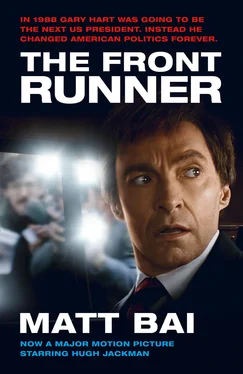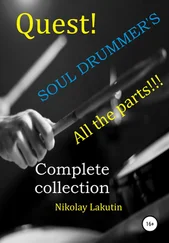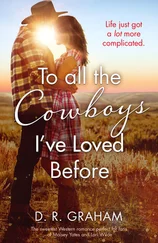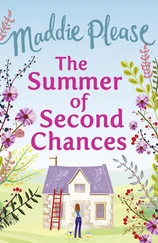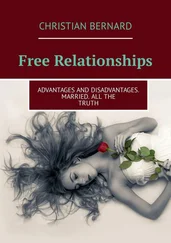I mused on why it was that Hart had become a relic from another time—“the political version of a Members Only jacket” is how I put it—and concluded that Hart mostly had himself to blame. If he was stuck in flypaper while others mired in lesser scandals had managed to escape, it was mostly because he refused to do the things you had to do if you wanted to rehabilitate yourself in the modern society—write an apologetic memoir, shed a tear on Oprah, plot out a publicly orchestrated comeback on the cover of People.
Hart detested the piece, of course, and shortly thereafter he publicly dropped any notion of a presidential campaign. I called him a few times afterward and even asked to have a drink on one of his occasional trips to Washington. I liked him, and it seemed to me his perspective on events would be different from the usual Washington wisdom. Hart was cordial but unavailable, and I stopped pestering him.
Once, just before the Iowa caucuses in 2004, after he had endorsed his friend John Kerry, Hart and I ended up standing next to each other in a huge barn somewhere near Ames, where Kerry was holding a rally. I thought Hart recognized me when I turned to him, but he said little and seemed to look right through me as we shook hands. He wasn’t invited onstage with some of Kerry’s other endorsers, and no one else there seemed to take note of him. We stood awkwardly and in silence throughout much of the rally, our backs pressed up against the wood beams of the barn wall, until I wandered off to say hello to some reporters I knew, and Hart slipped out into the cold, alone.
That was the second presidential campaign I had covered, and by then I was beginning to surmise that something critical was missing from our coverage of political candidates—mainly, the candidates themselves. Like a lot of my younger colleagues who’d passed on Wall Street jobs or law degrees so they could go off to small, middling newspapers and pursue elusive careers in journalism, my ambition had been forged by reading (and rereading) influential books: The Making of the President 1960, Fear and Loathing: On the Campaign Trail ’72, and What It Takes. What made political journalism so alluring, and so important, was the idea that you actually got to know the minds of the public servants you were writing about. You were supposed to share beers at the hotel bar and late-night confidences aboard the chartered plane. You were supposed to understand not just the candidates’ policy papers or their strategies for winning, but also what made them good and worthy of trust, or what didn’t.
There was the danger of getting too close, perhaps, in the way that a young Ben Bradlee ignored—willfully or otherwise—the dubious associations of his friend John Kennedy, or in the way that Richard Harwood, a reporter for The Washington Post, decided to remove himself from Robert Kennedy’s 1968 campaign because he had grown to like the candidate too much. (Kennedy was killed before Harwood had the chance to follow through.) But such was the challenge that came with sitting in history’s orchestra seats, charged with the sacred task of transmitting all that immediacy to the people crammed into the balcony and watching at home.
By the time my contemporaries and I got there, though, presidential politics—indeed, all of politics—was really nothing like that. With rare exceptions, our cautious candidates were like smiling holograms programmed to speak and smile but not to interact, so that it sometimes seemed you could run your hand right through them. They left the drinking and private dinners to the handlers who were expert in such things, whose job it was to help reporters by “reconstructing” the scenes of the day with self-serving narratives ( “And then I heard the senator say, ‘Don’t tell me what the polls say! I care about what’s right!’” ). Candidates in the age of Oprah “shared” more than ever before, but what they shared of themselves—boxers rather than briefs, allusions to youthful drug use—was trivial and often rehearsed, as authentic as a piece of plastic fruit, and about as illuminating.
Our candidates shared the same planes as their attendant reporters, but unlike their predecessors in the books of our youth, they literally hid behind curtains that divided their cabin from ours. Occasionally, prompted by press aides, they wandered back to have an impromptu, off-the-record conversation, which they conducted with all the fluency and abandon of a North Korean prisoner offering his televised confession. They issued gauzy position papers and used perfunctory interviews to recite their talking points, but they almost never engaged in informal, candid conversations about what they believed and how they had come to believe it. Their existences were guided by a single imperative, which was to say nothing unscripted and expose nothing complex.
Defensively, almost unconsciously, we tried to obscure this new reality from our readers and viewers. Reporters of my generation (some of us more than others) showed up on cable TV all day long and spoke wryly and knowingly of what the politicians thought, in tones that suggested we had just come from a private dinner or a late-night bull session, that we enjoyed the same insight as our role models. As time went on, some Americans who paid close attention to the news began to suspect that we were holding out on them, that our studied detachment was masking deeper convictions about our subjects, things we really knew about the candidates but were afraid to say because we might lose our precious access or jeopardize “cozy relationships,” or because it might violate the outmoded tenets of objectivity. The truth was harder to admit: most of the time, we had no real access, and we really didn’t know anything about the candidates personally you couldn’t have learned from browsing their websites or watching speeches on YouTube. And absent any genuine familiarity or argument of ideas, our glib prognostications sounded cynical and bland. There existed an unbridgeable divide—our own kind of troublesome gulch—between our candidates and our media.
There were lots of reasons that our politics had grown so dispiriting and so destructive over the years. They ranged from the growing dominance of political consultants to the decline of the industrial engine that once drove the American economy. And there were plenty of people, including a lot of campaign operatives, who argued that the shrinking influence of the professional class of political journalists was a good thing, that new technologies had broken the monopoly once held by a handful of self-appointed guardians of the public good, that candidates could now go around the media and speak, unfiltered, to the American voter. But when candidates no longer dared to speak unguardedly, or to explain the evolution of their thinking, or to say anything that might contradict anything else they’d ever said, they lost the ability to grapple with nuanced or controversial topics; essentially, they gave up trying to win the larger debate in the country, choosing to focus solely on the tactics of the next election, instead. New digital tools may have enabled them to reach voters directly, without a middleman, but all those voters were getting were the same old platitudes and scripted evasions, issued in a tweet or a video instead of a press release.
There was no single moment when all of this had suddenly come to pass. But as I chronicled one candidate’s campaign after another, grasping for some moment of authenticity or illumination, it was clear to me that something in the political culture had been badly broken in the years since Cramer had written What It Takes. And slowly, almost imperceptibly, Hart began to creep back into my thoughts.
It started as a stray reflection here and there, the brief connection of synapses as I drove across Iowa under an inky black sky, or as I sat in some god-awful roadside New Hampshire hotel, staring out at the snow-covered interstate at dawn. It grew into a doubt more pressing—a sense of something important that I had left unfinished or unexplored. I noticed how often Hart’s name came up now in the articles about John Edwards or about Tiger Woods, as if his was the most important or immoral one-night stand in the history of one-night stands, the standard of public humiliation against which all others had to be measured. Perspective, I could hear Hart saying. Perspective.
Читать дальше
